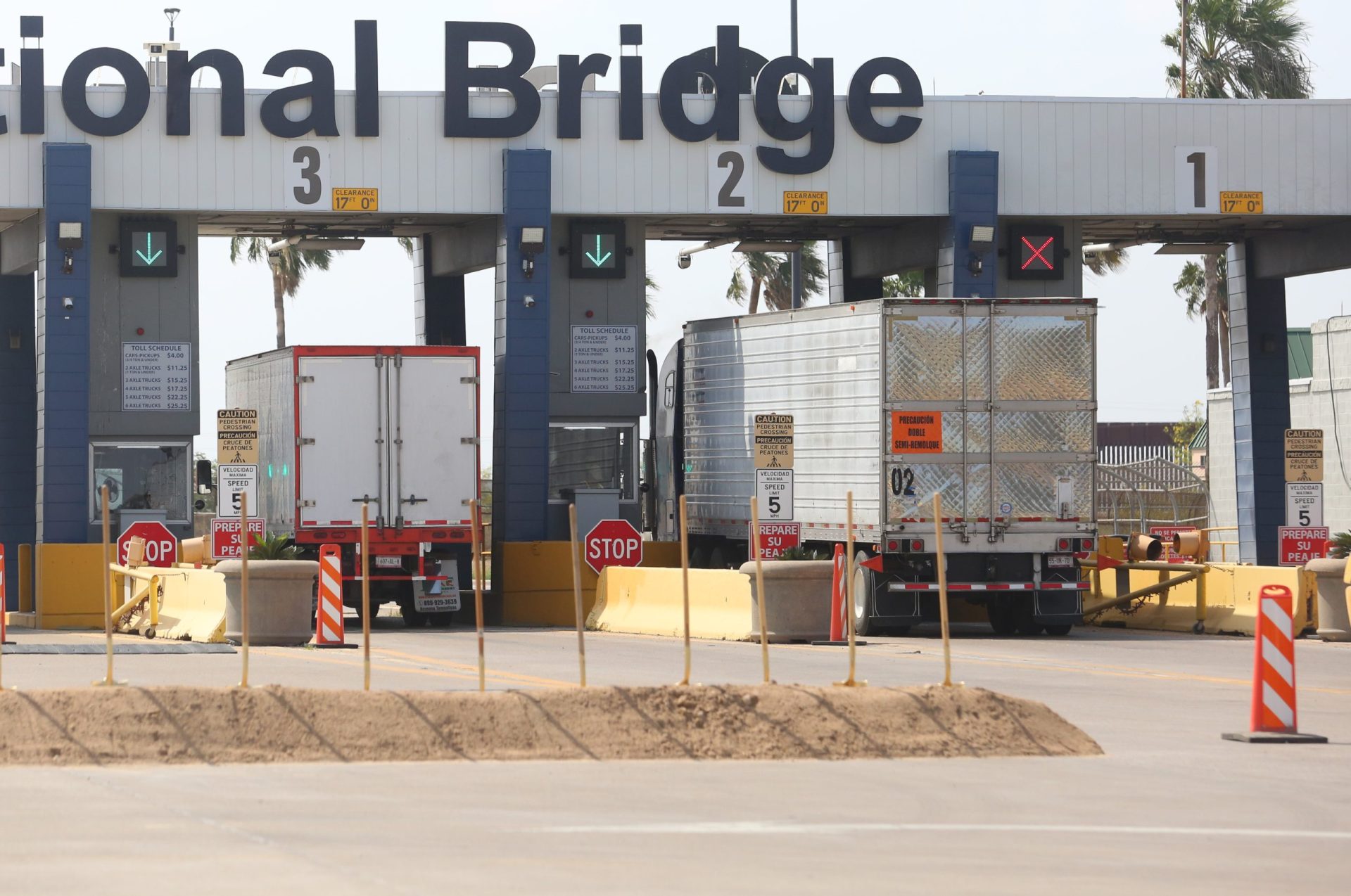A new study from the Center for Border Economic Studies at the University of Texas Rio Grande Valley concludes that the Trump administration’s use of tariffs as a “central tool of economic and political leverage” has the potential to do serious damage to the economies of the United States, Canada and Mexico, assuming Donald Trump follows through on his threats.
The study also zeroes in on the potential impact of tariffs on the Valley’s economy.
Trump said on Feb. 18 that he intends to impose tariffs on the automotive industry “in the neighborhood of 25%” as soon as April 2. The news was followed by a drop in global auto stocks. Trump said he was considering similar tariffs on pharmaceutical and semiconductor imports.
“The Use (and Misuse) of Tariffs in North America: A New Trade War?” is the title of the new study, authored by Maroula Khraiche and Jean-Baptiste Tondji, associate professors with UTRGV’s Robert C. Vackar College of Business and Entrepreneurship, and Armando Lopez-Velasco, assistant professor with the college.
 Tractor trailers cross into Mexico at the Pharr International Bridge on Tuesday, March 7, 2023, in Pharr. (Joel Martinez | jmartinez@themonitor.com)
Tractor trailers cross into Mexico at the Pharr International Bridge on Tuesday, March 7, 2023, in Pharr. (Joel Martinez | jmartinez@themonitor.com)They write that, while tariffs in some cases can help counter unfair trade practices, applying them indiscriminately “poses significant economic risks, potentially destabilizing not only the U.S. economy but also key trade partners like Mexico and Canada.”
These nations, heavily reliant on trade with the U.S., would face severe economic repercussions under an extensive tariff regime,” according to the study.
“Strategically, the threat of tariffs can serve as a bargaining tool to secure concessions on issues such as border security, control of illicit substances (e.g., fentanyl), and deportation agreements,” the authors write. “However, broad-based protectionism can lead to unintended consequences, including currency appreciation that undermines U.S. export competitiveness.
“Additionally, economic strain in Mexico due to restrictive trade policies may exacerbate unauthorized migration, contradicting U.S. immigration objectives.”
Despite warnings from serious economists across the political spectrum, Trump has fixated on tariffs to fight against a decline in U.S. manufacturing and what he perceives as unfair treatment of the United States by its trading partners in the form of trade deficits.
It’s probably a bad idea, according to the study’s authors.
“Economically, addressing trade deficits through tariffs is misguided, as bilateral trade balances are not a primary macroeconomic concern,” they write. “More pressing is the U.S. budget deficit, which poses a greater risk to financial stability. Furthermore, an all-out trade war could accelerate global efforts to reduce reliance on the U.S. dollar, diminishing American economic influence.”
 Araceli Benitez and Maria Morales sift through bell peppers coming from Coahuila, Mexico at the San Rey produce terminal in Pharr on Tuesday, April 2, 2019. (Delcia Lopez | dlopez@themonitor.com)
Araceli Benitez and Maria Morales sift through bell peppers coming from Coahuila, Mexico at the San Rey produce terminal in Pharr on Tuesday, April 2, 2019. (Delcia Lopez | dlopez@themonitor.com)In 2023, approximately 80% of Mexican exports and 78% of Canadian exports went to the United States, though only 15% of U.S. imports can from Mexico and 14% from Canada, according to the study.
The percentage of the U.S. gross domestic product (GDP) generated by import-export trade with Canada and Mexico was 17.5% that year. The percentage of Mexican GDP generated by trade with the United States and Canada, on the other hand, was 63%. The percentage of Canada’s GDP generated by import-export trade with the United States and Mexico was 51.7%, the authors write.
Therefore, the United States is much less dependent on the trading arrangement for its GDP than the other two studies, according to the study.
Although “a few tariffs in certain sectors” probably would not cause large numbers of migrants to seek work in the United States (as long as Mexico’s economy grew at a pace similar to that of the United States), an all-out trade war “would reduce overall trade and likely deliver a more significant blow to the very open Mexican economy, leading to increased unauthorized migration to the (United States),” the authors write.
“These expected effects are inconsistent with the Trump administration’s objectives on unauthorized immigration: Keeping unauthorized migration at a low level is incompatible with harming the Mexican economy and other source countries of unauthorized immigration,” according to the study.
As for the Valley’s economy, Trump’s tariffs could cause problems, the authors write.
“Increasing tariffs on imports and exports could generate adverse consequences, including manufacturing and supply chain disruption, trade, job losses, and economic slowdown,” according to the study. “RGV farmers, who export citrus and other agricultural products to Mexico, could face reduced demand if Mexico imposes retaliatory tariffs.
“The burden on farmers can be significant if the tariff dispute includes additional costs of seeds, fertilizers, and agricultural equipment. If farmers and retailers can’t pass on extra costs to their customers or receive other support from the government, they will exit the market.”
 Workers prepare the soil before planting melons on farmland Thursday, Feb. 6, 2025, in Donna. (Joel Martinez | jmartinez@themonitor.com)
Workers prepare the soil before planting melons on farmland Thursday, Feb. 6, 2025, in Donna. (Joel Martinez | jmartinez@themonitor.com)The study noted that a large percentage of local businesses in the Valley depend on Mexican goods, while exports from the maquiladora industry, which assembles goods at plants south of the border using parts from the United States, support jobs at trucking, warehousing and logistics companies in the Valley.
The authors conclude that, while the strategic threat of tariffs may serve as a bargaining tool to extract concessions from other countries on border security, the flow of illicit drugs or other matters, “broad-based protectionism” can backfire, leading to currency appreciation that undercuts U.S. export competitiveness, plus greater economic strain on Mexico, exacerbating unauthorized migration to the United States.
“While targeted tariffs against unfair trade practices — such as intellectual property violations — may be justified, widespread protectionism risks economic instability and geopolitical backlash,” they write. “Perhaps a measured, strategic approach to tariffs is the most pragmatic course of action.”
The post UTRGV business faculty study eyes tariff downside appeared first on MyRGV.com.
 (2).png)
 1 day ago
24
1 day ago
24








 English (US)
English (US)